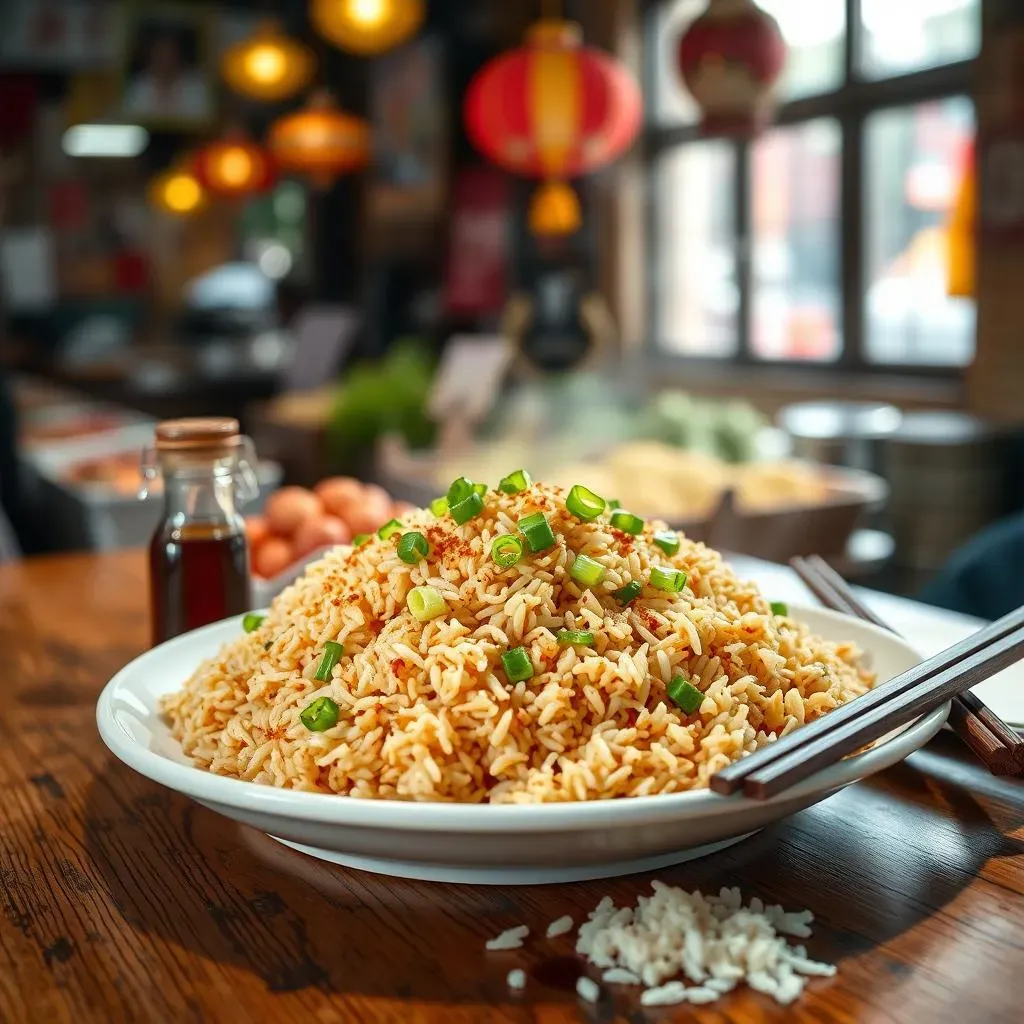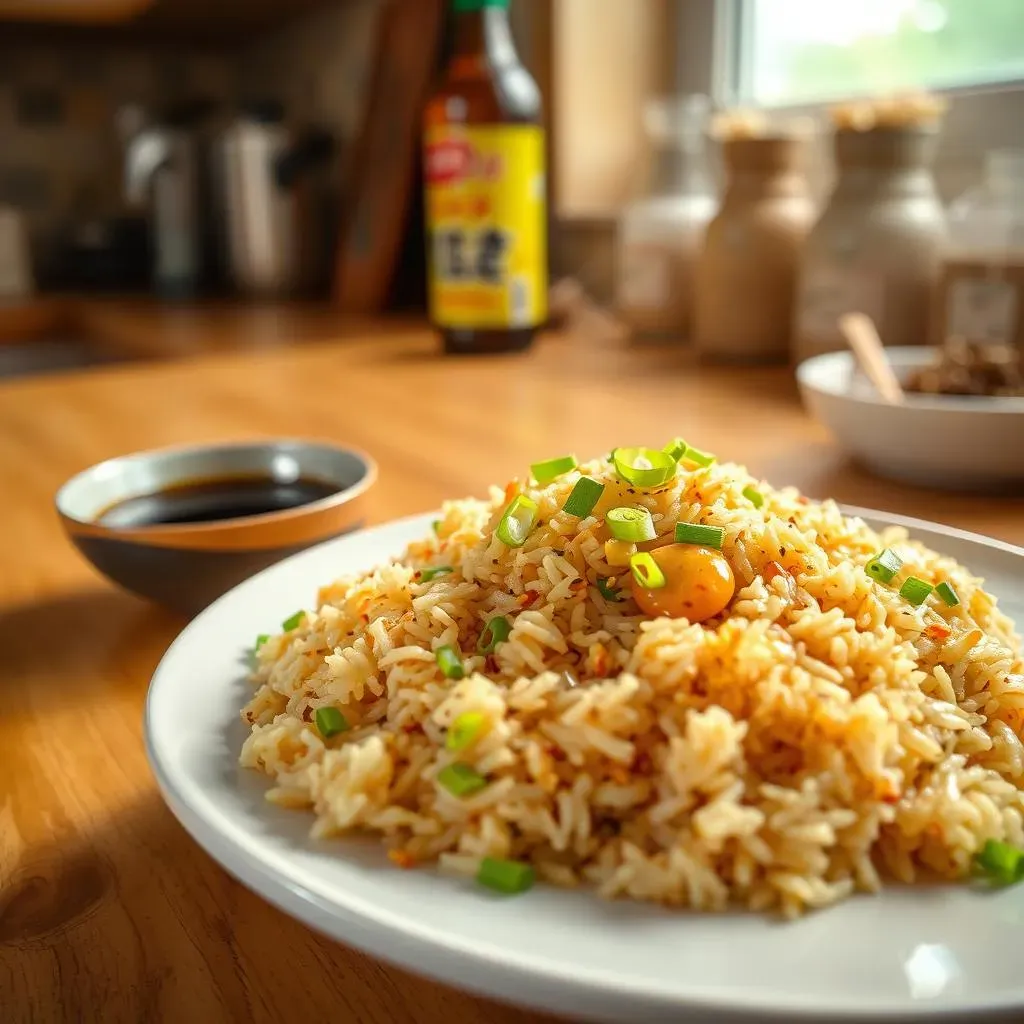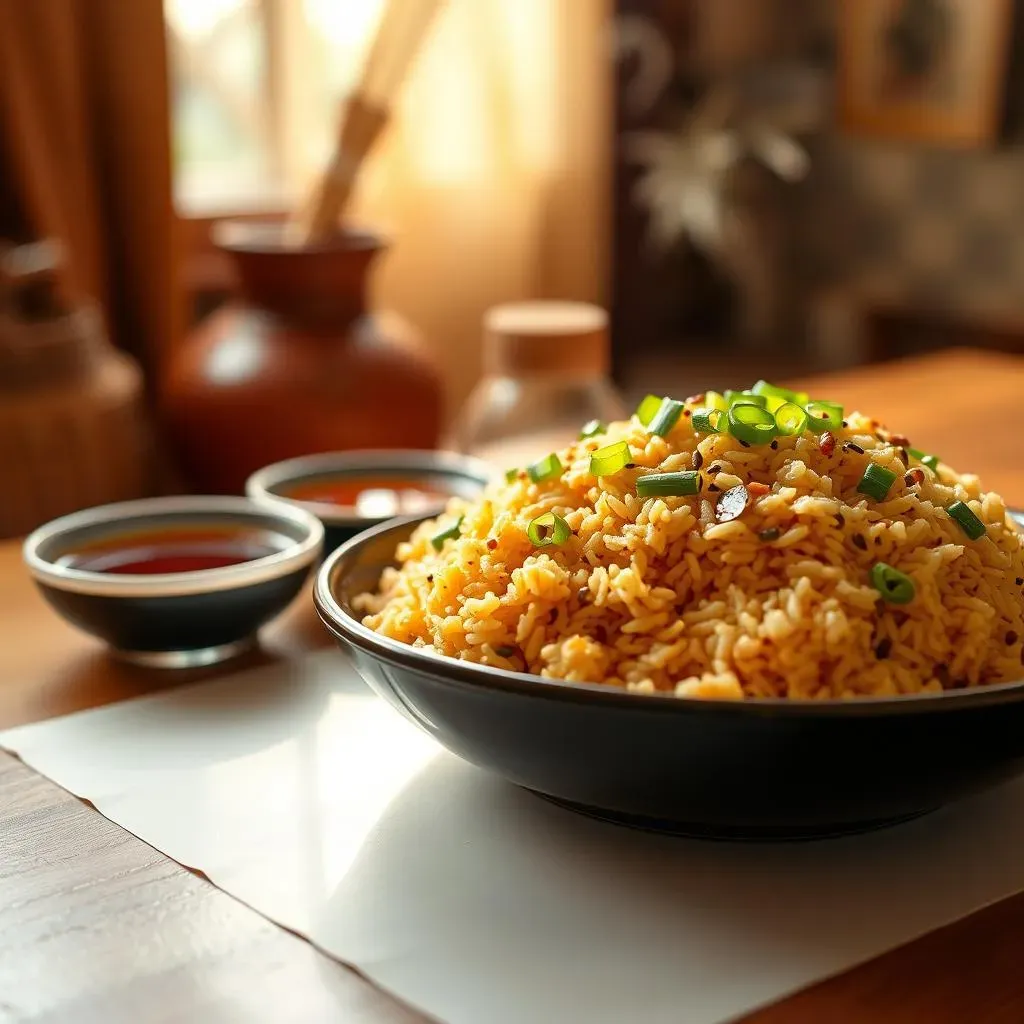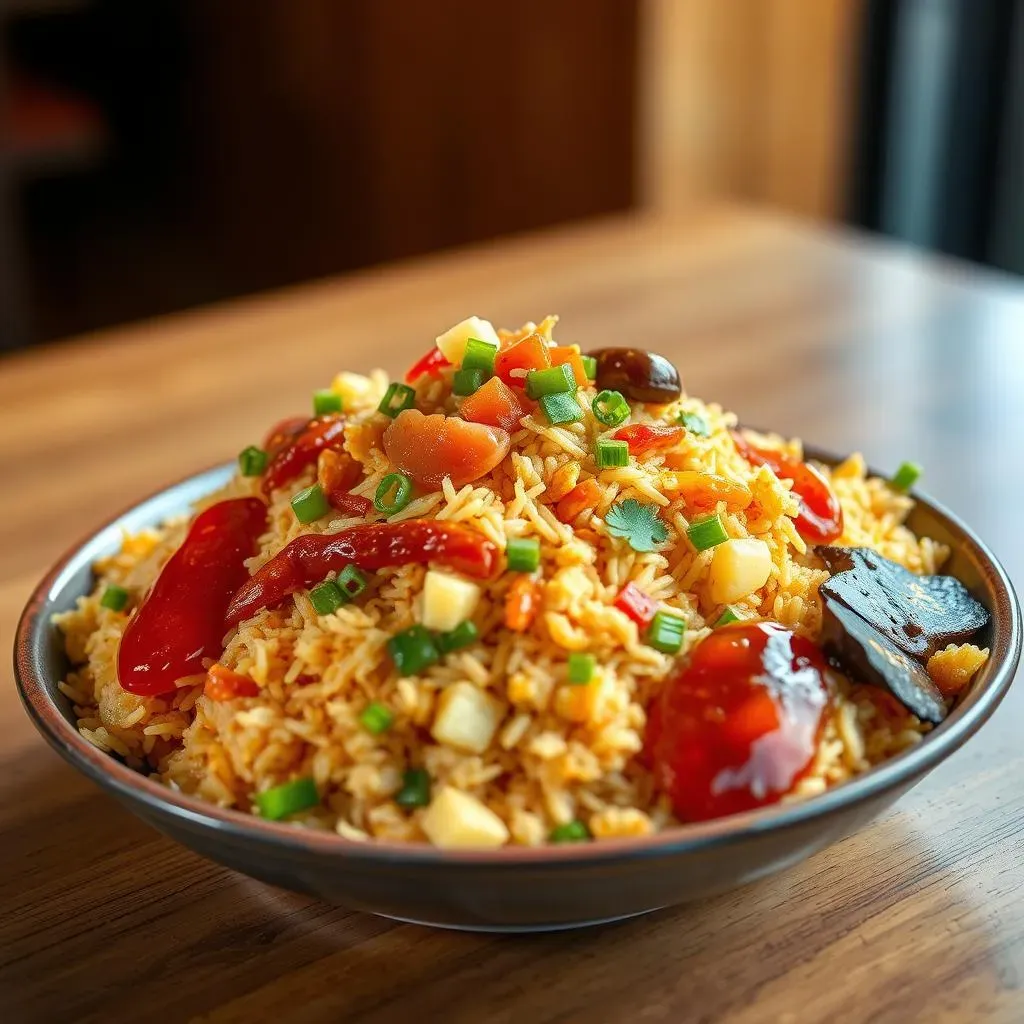Table of Contents
Fried rice: a culinary chameleon, capable of transforming simple ingredients into a symphony of flavors. But the secret weapon in achieving truly exceptional fried rice? The sauce! This article is your passport to unlocking the world of the best sauces for fried rice. We'll embark on a flavor journey, exploring the foundational role of soy sauce, the umami boost provided by oyster and fish sauce, and the sweet and savory magic of teriyaki and hoisin. Get ready to go beyond the basics, as we uncover unique sauce combinations that will elevate your fried rice game to the next level. Whether you're a seasoned chef or a kitchen novice, this guide will equip you with the knowledge to create fried rice so delicious, it'll have everyone asking for seconds (and maybe even thirds!). So, ditch the bland and embrace the bold – let's discover the perfect sauce to make your fried rice truly unforgettable. Prepare to be amazed by the transformative power of the right sauce. Let's get started!
Soy Sauce: The Foundation of Flavor

Soy Sauce: The Foundation of Flavor
The Umami Underpinning
Let's talk soy sauce. It's not just some salty liquid; it's the bedrock of countless Asian dishes, and fried rice is no exception. That deep, savory flavor, that umami punch? That's all soy sauce. It’s the glue that holds everything together, adding a rich depth that other sauces just can't replicate. Think of it as the unsung hero of your fried rice, quietly working behind the scenes to elevate the whole dish. Want to make sure your rice is perfectly cooked? Check out our guide on the best rice for fried rice!
Soy Sauce Type | Flavor Profile | Fried Rice Application |
|---|---|---|
Light Soy Sauce | Salty, slightly sweet | Base flavor, adds subtle sweetness |
Dark Soy Sauce | Rich, intense, slightly sweet | Adds color and depth of flavor |
Tamari | Strong, savory, gluten-free | Adds a robust flavor, great for gluten-free options |
Balancing Salt and Sweetness
The key with soy sauce isn't just *adding* it, but *balancing* it. Too much, and you'll have a salty mess. Too little, and your fried rice will lack that essential savory foundation. Start with a small amount, taste as you go, and adjust to your preference. Remember, you can always add more, but you can't take it away! Consider what other ingredients you're using. If you're adding sweet vegetables like carrots or corn, you might need a little extra soy sauce to balance the sweetness. And don't forget the importance of selecting the best vegetables to complement your sauce choice.
“The best fried rice is a harmony of flavors, and soy sauce is the conductor of the orchestra.” - A wise chef (probably)
Beyond the Basics: Exploring Variations
While regular soy sauce is a fantastic base, don't be afraid to experiment! Low-sodium soy sauce is a great option for those watching their salt intake. Alternatively, you could try a splash of coconut aminos for a slightly sweeter, nuttier flavor. Or, for a bolder taste, consider adding a dash of fish sauce or oyster sauce alongside your soy sauce—we'll be discussing those in more detail later! For a truly umami explosion, adding a pinch of MSG (monosodium glutamate) can enhance the savory notes of your soy sauce base. If you’re looking to spice things up, you could always consult our guide on the best spices for fried rice to add some heat and complexity to your dish.
- Low-sodium soy sauce
- Coconut aminos
- Fish sauce
- Oyster sauce
- MSG (monosodium glutamate)
Elevating Umami: Oyster Sauce and Fish Sauce

Elevating Umami: Oyster Sauce and Fish Sauce
Oyster Sauce: The Umami Bomb
Now, let's talk oyster sauce. This stuff is seriously magical. It adds this unbelievable depth and richness to your fried rice – a complex umami flavor that's both savory and subtly sweet. It's like a secret weapon, transforming your dish from ordinary to extraordinary. A little goes a long way, though! Start with a teaspoon and taste as you go. Too much oyster sauce can overpower the other flavors. Want to make sure you're using the best ingredients? Check out our tips on choosing the best protein for fried rice to perfectly complement your sauce.
Oyster Sauce Type | Flavor Profile | Fried Rice Application |
|---|---|---|
Light Oyster Sauce | Subtle, savory, slightly sweet | Adds a delicate umami boost |
Dark Oyster Sauce | Rich, intense, umami-forward | Adds depth and complexity |
Fish Sauce: The Secret Ingredient
Okay, here's where things get interesting. Fish sauce. I know, it might sound a little off-putting at first, but trust me on this one. Just a tiny dash adds an incredible depth and complexity to your fried rice, a savory umami punch that's unlike anything else. It's the kind of flavor that makes you go "hmm, what is that?" in the best possible way. It's subtle but powerful, adding a certain *je ne sais quoi* to your dish. This is especially important if you're working with delicate vegetables. Remember to choose the best vegetables to ensure a balanced flavor profile. Don't be afraid to experiment!
- Start with a small amount (a teaspoon or less).
- Taste frequently and adjust as needed.
- Pair it with other umami-rich ingredients like mushrooms or shrimp.
Sweet and Savory Symphonies: Teriyaki and Hoisin

Sweet and Savory Symphonies: Teriyaki and Hoisin
Sweet and Savory Symphonies: Teriyaki and Hoisin
Now, let's dial up the sweetness and savoriness! Teriyaki sauce, with its signature blend of soy sauce, mirin, and sugar, brings a delightful balance of sweet and salty to the party. It's a fantastic option for adding a touch of glossy richness and a more pronounced sweetness to your fried rice. Think of it as the sophisticated cousin of soy sauce—a little more refined, a little more complex. Want to ensure your rice is perfectly cooked? Check out our guide on the best rice for fried rice.
Sauce | Flavor Profile | Fried Rice Application |
|---|---|---|
Teriyaki | Sweet, savory, slightly tangy | Adds a glossy richness and balanced flavor |
Hoisin | Sweet, savory, slightly spicy | Adds a depth of flavor and a touch of spice |
Hoisin sauce, on the other hand, adds a unique depth and a hint of spice. Its rich, slightly sweet and savory profile, with a touch of umami, makes it a fantastic choice for adding a touch of complexity and a more pronounced savory note. It’s particularly great when paired with protein-rich fried rice, like our recommendations for the best protein for fried rice. Both teriyaki and hoisin sauces offer a fantastic way to add a more pronounced flavor profile to your fried rice, beyond the standard soy sauce-based options.
- Teriyaki: Use sparingly, as it can be quite sweet.
- Hoisin: A little goes a long way—start with a teaspoon and adjust to taste.
- Experiment with combinations! Try a mix of teriyaki and hoisin for a unique flavor.
Beyond the Basics: Exploring Unique Sauce Combinations

Beyond the Basics: Exploring Unique Sauce Combinations
Sweet Chili Heat
Let's spice things up! Sweet chili sauce adds a delightful kick of heat and sweetness to your fried rice, creating a flavor profile that's both exciting and satisfying. The balance of sweet and spicy is a game-changer, adding a vibrant dimension to your dish. It pairs beautifully with many proteins, so be sure to check out our guide on the best protein for fried rice for some inspiration! A little goes a long way with sweet chili sauce – start with a teaspoon and adjust to your liking. Remember, you can always add more, but you can't take it away!
- Start with a small amount.
- Taste and adjust.
- Pair with shrimp or chicken for a delicious combination.
Gochujang's Umami Depth
For a truly unique flavor adventure, consider adding gochujang, a fermented Korean chili paste. This paste brings an intense umami depth, a subtle sweetness, and a delightful smoky heat to your fried rice. It’s not just about the spice; it's about the layered complexity it introduces. The rich, savory notes of gochujang elevate the overall taste, creating a fried rice experience that's both comforting and exciting. Gochujang pairs perfectly with many vegetables, so remember to consult our guide on the best vegetables for fried rice to get some inspiration.
Sauce | Flavor Profile | Fried Rice Application |
|---|---|---|
Sweet Chili Sauce | Sweet, spicy, tangy | Adds a vibrant kick |
Gochujang | Savory, sweet, spicy, umami | Adds depth and complexity |
The Magic of Miso
Want to add a touch of something unexpected? Try miso paste! This fermented soybean paste brings a unique salty, savory, and slightly sweet flavor that adds a depth of complexity and a hint of earthiness to your fried rice. The umami punch is incredible, and it’s a surprisingly versatile ingredient that complements a wide range of flavors. Miso pairs well with both vegetables and proteins, so feel free to experiment with different combinations. For perfectly cooked rice, be sure to check out our guide to the best rice for fried rice before you get started! Don't be afraid to try something new!
"The best fried rice is a journey, not a destination." - A very philosophical chef (probably)